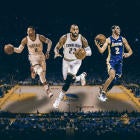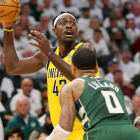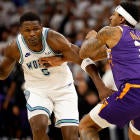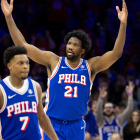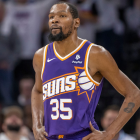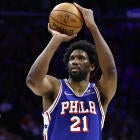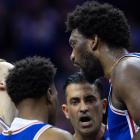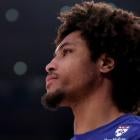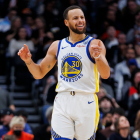The Warriors are what they are. They're the best team in the league, the defending champion and executives for teams that are thriving still put them in a separate category. The Warriors lose when they rest players or don't invest themselves, but they romp the rest of the time. They have the luxury of controlling their fate to an absurd degree.
The fervor over them has also chilled. Stephen Curry is having what may be his best season in terms of the complete nature of his game, but he's not dropping absurd numbers of 3-pointers. Their performance marks are great, excellent, near the top of the league, but not historic. They're a great team, the best team.
But in the regular season? They're not really important. Important means we need to talk about them. They need to be discussed. Their highs and lows mean something to the greater NBA conversation. These teams aren't the best teams. But they are the most important teams, right now.
 1. Boston Celtics
1. Boston Celtics
The Celtics are a terrific story, a fascinating puzzle and an entrenched maze of narratives concocted by local and national media.
Let's start with what the Celtics are. They are:
- A defensive juggernaut whose defensive rating (98.3) ranks as the best in the league
- A well-distributed offense that gets everyone involved and isn't truly reliant upon any particular player.
- The clutchiest-clutch-timing team that ever clutched; 15 of their 21 games have been within five points in the final five minutes, with a record of 11-4, and nine of their games have been within three points inside the final two minutes, with a 7-2 record.
Here's what they are not:
- A good offensive team; Boston is 16th in offensive rating (points per 100 possessions) and has been as low as 21st.
- A team featuring a mind-bending superstar MVP in Kyrie Irving. But while Irving has been good, way better defensively than expected, fantastic in the clutch, and a great leader, his actual production has mirrored or come in slightly behind that of his year last season with a much smaller role on the Cavs -- he's started to turn it on in the last two weeks but he's been at standard-star-guard level.
- Beating up on bad teams; despite the eighth-easiest strength of schedule, they have wins over the Warriors, Spurs, Thunder and Raptors.
Boston's formula is sound, if a bit confusing. They're a young team that suffocates opponents with defense, which is usually a problem for inexperienced players. The Celtics typically go into the half down. They've trailed at half in 12 of their 22 games, yet they are 8-4 in those contests. Boston hits teams with devastating third quarters; it has outscored teams by 119 points in the third quarter, good for second-best in the league.
Struggle early, keep it within range with defense, go on a massive third-quarter run then close close games with Irving's special clutch scoring and great defense. The question is whether this is sustainable, or if their penchant for living on the edge with close games, which can be so sensitive to individual sequences, will result in a regression.
What's maybe most promising is Irving's defense, as he leads the Celtics in deflections with 55. It's evident that he's engaged defensively. Here, on a scrambled play off an offensive rebound, which are super dangerous, Irving swipes at the ball while running out to cover the perimeter shooter. The deflection causes the turnover. On the same sequence, Aron Baynes runs off a corner shooter then recovers low and the weakside guys clog the lanes.
The Celtics are disciplined and working harder than any team in the league right now. They have a great closer in Irving, and Al Horford has been their MVP. There's a lot going their way, which has given them a huge lead out in front of the Eastern Conference (already 3.5 games up on second-place Detroit, even after the Pistons' win Monday night). The reality is that even if Boston comes back to Earth for a significant stretch of time, it's going to remain in contention for home court in the first two rounds at least, barring a disaster.
 2. Houston Rockets
2. Houston Rockets
The Rockets lost Chris Paul in the first game of the season, but it turns out the vision that their front office had for how to reconstruct this team after such a successful year in 2016-17 worked out pretty well anyway through the first month of the season. Houston sports the second-best offense in the league, and the seventh-best defense, with the second-best point differential (per-100 possessions) behind Golden State
Put quite simply, the Rockets are a machine.
James Harden leads the league in points and is second in assists per game to his teammate Chris Paul, while leading the team with the best record in the West. He's been the leader for MVP so far. There's a lot of interesting stuff happening under the hood, too.
Like this nifty chart:
Combo | Offensive Rating | Defensive Rating | Net Rating |
Harden and Paul | 118.4 | 112.4 | +6.0 |
Harden without Paul | 115.2 | 100.8 | +14.4 |
Paul without Harden | 118.1 | 83.9 | +34.4 |
Now, Paul's only been back for a handful of games, and in most of that he's played with Harden, so those "Paul without Harden" numbers are a little out of wack. Still, it is eye-opening that the Rockets are so good, with Paul having the most assists through five games of any Rocket in history, and yet the combo of them together had a negative net rating until just this week. It's especially weird because of the defense when the Rockets' D has been surprisingly stout. It's shifted a full ten points this week, which shows they're getting it together. Then I took a look at what these guys look like with and without center Clint Capela:
Harden and Paul | Offensive Rating | Defensive Rating | Net Rating |
with Capela | 115.9 | 114.1 | +1.7 |
without Capela | 126.7 | 107.4 | +19.3 |
Again, the sample sizes on these things are small, so take it with a grain of salt, but bear in mind this reflects the general trend. The Rockets have been five points better with Capela on the bench defensively overall. This will probably turn around; Capela's a good player, a great defender and an awesome finisher on lobs, which opens up a lot for Houston. A source close to the team said there wasn't any concern within the team about these figures this early in the season when it comes to Capela, and like the Paul-Harden trends, their net rating with those three together went from a negative to a positive this week. What's maybe more important than how they are with Capela is how they are with P.J. Tucker at center, aka the "TuckWagon" lineups.
Lineups with Tucker on the floor that do not feature one of the Rockets' bigs sport a 99.6 defensive rating, and a 112.4 offensive rating for a plus-12.8 net. They destroy teams. Whether that holds is dubious, but it is fascinating that the Rockets get better defensively by going ultra-small.
Oh, and here's something to terrify you. The Rockets are now having Harden come up off screens for catch-and-shoot off CP3 passes before Paul's even over half-court:
Good luck with that.
 3. Cleveland Cavaliers
3. Cleveland Cavaliers
The Cavaliers, unlike the two teams above them, are not here because of their success, but because of their relative struggles and how they are trying to find their way out of them. The Cavs wound up spiraling out of the gate; they and the Celtics had inverse seasons for a while. They were so bad defensively for the first four weeks of the season that despite being fourth in defensive rating over their last nine games -- a nine-game win streak -- they remain ranked 25th in points allowed per 100 possessions. They were 30th going into Monday's game vs. Philadelphia.
There's a whole swirling vortex of stuff to try and figure out with Cleveland. A sampling:
- The Cavs are way better defensively when Dwyane Wade is on the floor. I looked at pairings and combinations and seriously, Wade's presence has helped every rotation player defensively. Every single player has a better defensive rating, often by more than 10 points allowed per 100 possessions, with Wade on the court.
- It is almost impossible to understate how much Derrick Rose not playing has helped Cleveland, on both ends of the floor.
- LeBron James is putting up career numbers, and his career sets kind of a high bar.
- Meanwhile, Rose is "away from the team" indefinitely and pondering his basketball future, according to reports.
- James is still dropping vague, weird Instagram posts, this time the "Arthur" meme.
- Cleveland is still one of the best offensive teams in the league, and now just a half-game back of Detroit for the second spot in the East.
The Cavs have been important because when they look bad, they feel like a team on the brink of separating and falling completely apart. When they bring it together, you're constantly reminded how good James is and how he makes every player on the floor with him better.
Are they going to try and make a big trade to get back into the serious arms race? Can the defense keep it together? Can James keep managing this workload at age 33 which he turns next month? Most people expect the Cavs to be there at season's end, but things are a lot more temperamental than they're made out to be. They can be great, they can implode, and waiting for both is a day by day experience.
 4. Oklahoma City Thunder
4. Oklahoma City Thunder
This is the worst good team ever.
OKC has the eighth-best net rating in the league, which is point differential per 100 possessions. That's a much better indicator of team strength than record. By quarter in net rating the Thunder rank:
1st quarter: 2nd
2nd quarter: 8th
3rd quarter: 24th
4th quarter: 25th
They have beaten the Warriors, the surprisingly good Pacers and the Bucks. Yet, they are 8-12 on the season. Moreover, I detailed their crunch time woes early, and that trend has only continued. They are now 1-9 in games inside five points in the final five minutes, and remarkably, 0-7 in games inside three points in the final two minutes. Teams should be able to accidentally stumble into a win somewhere in games that close.
It's been a circus show of errors. OKC's defense explodes when games get tight. The Thunder sport a 138.7 defensive rating in games within five points in the final five minutes. That's not much worse than the second-worse team (Atlanta) but it is over 30 points worse than the 15th-ranked team in Houston.
So a lot has gone against them, despite their being very good. The offense, however, is an issue. Only Paul George and Carmelo Anthony are shooting over 37 percent from 3-point range, and Patrick Patterson has struggled. Russell Westbrook is shooting 40 percent from the field and 30 percent from 3, averaging nearly five turnovers per game. He's been bad. And yet, the Thunder should be better. OKC has the widest margin between its win percentage and expected Pythagorean win percentage of any team in the league, and that gap is nearly twice that of the seconnd-worst team in that department, Toronto.
The Thunder should be better than they are. They likely will improve in terms of win record if they keep playing this way. But the frustration is evident, and with George's free agency looming, there's just a lot to wonder about with this team. If they get it together, watch out. If they don't, the drama's only going to improve.
 5. Philadelphia 76ers
5. Philadelphia 76ers
Philadelphia's relevant! In a really big way! This is super exciting.
Now, as Brad Botkin breaks down in his latest NBA Star Index, a lot of Ben Simmons' numbers are dependent on the players around him. But what's made this team so important early on is how good they are when he is surrounded by those weapons.
The Sixers' starting lineup of Simmons, J.J Redick, Dario Saric, Robert Covington and Joel Embiid boasts a 112 offensive rating, a 91.8 defensive rating and a net rating of plus-20.4 points per 100 possessions. They absolutely vanquish opponents.
Here's what's important about the Sixers. They have a formula for success that means not only that they can improve from now until the playoffs, but that they legitimately pose a playoff threat. You get to see this team coming into its own, and in a postseason series, they have what you need. They can defend, they can spread the floor and they have the star power to make plays and punish mismatches.
If you go small vs. Embiid, you will be punished into oblivion. If you give Simmons space, he'll tear you apart with passing. If you send the double, they have shooters to hurt you. The Sixers are good now. But pay close attention, there's a real chance this team makes a postseason run, and because they're young, there's a good chance their playoff seed will be lower than how dangerous they are.
 6. Los Angeles Lakers
6. Los Angeles Lakers
I thought the Lakers were going to be completely awful coming into the season, especially after their preseason. Then they got off to a good start, and maybe I was too hasty. Oh, but no, they are 4-8 since starting 5-5 and have fallen to 28th in offense and while they are still seventh in defense, they're slowly starting to fall back in that area as well.
But really, let's be honest, what's important about them is Lonzo Ball. This is despite how well Brandon Ingram, Kyle Kuzma and Julius Randle have played. Ball is the story.
He's putting up historic assist numbers, no matter how generous some of them might be. His rebounding has been legitimately terrific; he has a nose for the ball very few do at his age. He is quite literally one of the absolute worst shooting rookie guards we've ever seen, but there's still reason to think he can outgrow that. He's hurt to some degree by how the team has designed absolutely everything around him. They are better when he just tries to be a part of the offense. His father is a distraction, but not too much of one yet.
The other reason this team is so important? They're 8-13, but the general feeling about this team is that they are surging as a franchise. There's optimism. And that bleeds into this summer, when, of course, George will be a free agent. The Lakers can lose, that's fine, but there has to be a sense that they are going somewhere. That will be a tough test, keeping up that feeling for the next five months, regardless of their record, which it looks like will be pretty bad.
Honorable mention: Indiana, New York, New Orleans













